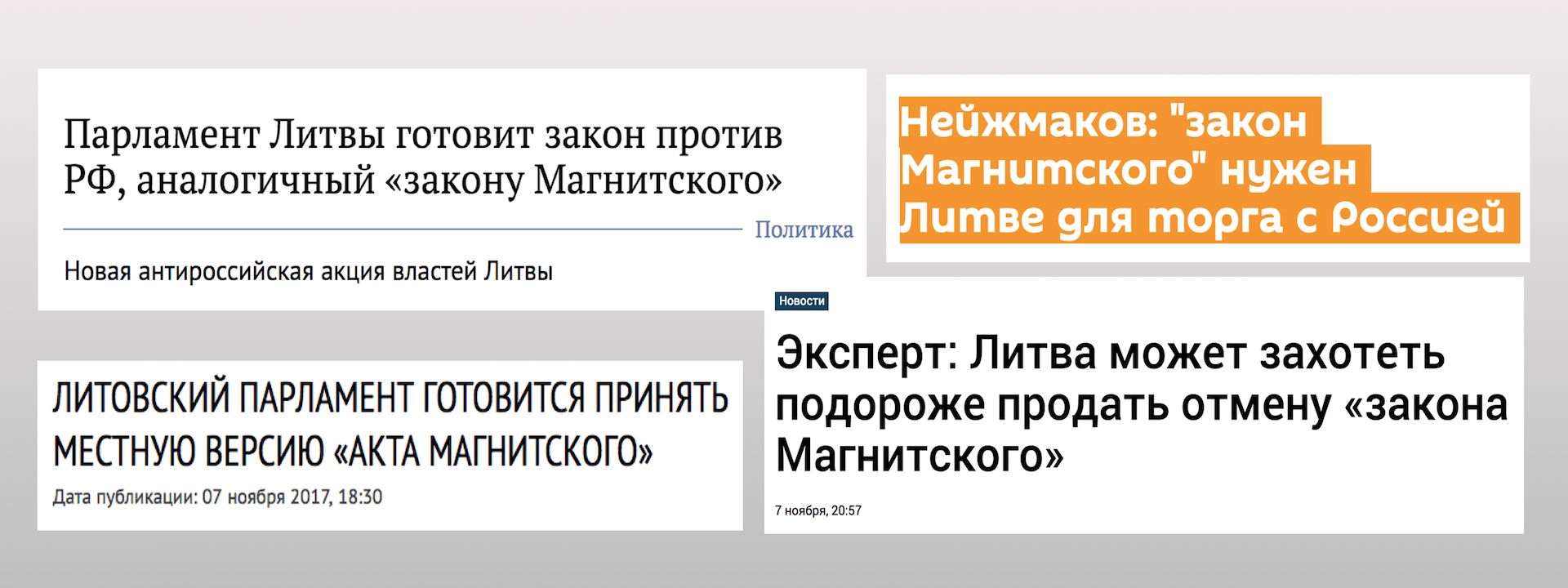Kremlin Media Mobilizes Against Magnitsky Act in Lithuania
A brief look into pro-Kremlin media narratives on Lithuania’s approval of Magnitsky Act
Kremlin Media Mobilizes Against Magnitsky Act in Lithuania

A brief look into pro-Kremlin media narratives on Lithuania’s approval of Magnitsky Act

On November 16, Lithuanian Parliament passed a bill commonly referred to as the Lithuanian Magnitsky Act. The new law will prevent foreigners connected to large-scale money laundering, corruption, or human rights abuses from entering Lithuania.
Recently, a similar law was passed in Canada, which provoked a strong response from the pro-Kremlin media, which @DFRLab documented. The Lithuanian version of the bill did not go unnoticed, the pro-Kremlin media was mobilized weeks ago to discredit Lithuania’s efforts.
Background
The story behind the Lithuanian Magnitsky bill dates back nearly a decade. In 2009, a Russian lawyer turned auditor, Sergey Magnitsky, died while in police custody in Moscow. He was investigating a tax fraud scheme allegedly used by Russia’s Ministry of Interior and Kremlin officials. According to his findings, Russian officials stole upwards of $230 million from Russia’s state budget over the course of several years.
When Magnitsky sued the Russian state, he was arrested. He died in police custody less than a year later. Magnitsky’s death made international headlines, but did not drive action in and of itself. Bill Browder, the man who hired Magnitsky to investigate the fraud, lobbied the United States Congress to pass the Magnitsky Act in 2012.
The intent behind the American legislation was to punish Kremlin officials complicit in Magnitsky’s death by prohibiting their entrance into the United States and freezing their financial assets within the American banking system. The Lithuanian bill is similar in its intent, but it does not include an asset freeze.
Media response
The pro-Kremlin media campaign to undermine the bill started at least two weeks before the bill was passed.
On October 25, the pro-Kremlin REGNUM news published an article titled “Lithuania’s Parliament is preparing a law against the Russian Federation, similar to “Magnitsky Act”, accusing Lithuania of Russophobia, a common allegation Kremlin media peddles against the Baltic states. The sub-headline read: “The new anti-Russian action of the Lithuanian authorities”. Similar sentiment was presented in an article published on Russian Dialogue, another pro-Kremlin news outlet, which referred to the bill as “Russophobic”.
Shortly after the Tuesday vote, RIA news published an interview with Mikhail Neizmakov, a REGNUM contributor, who argued the bill was just a bargaining chip that Lithuanian government will use to get concessions from Russia. He said:
“Lithuania will use it when negotiating with Russia, although this law will not cause any real damage to Russian officials”.
The same interview was also published by the pro-Kremlin Rubaltic.ru and the Kremlin-funded Sputnik News.
This narrative is in direct contradiction to the reasoning behind the bill, initiated by a member of Parliament and the leader of the Conservative party, Gabrielius Landsbergis, who in an interview with 15min.lt said:
“Lithuania has a historic chance to enter its name into the list of principled countries, which do not tolerate these chilling crimes that happen outside our state borders”.
Another pro-Kremlin media outlet News Front, which is reportedly funded and controlled by the Russian secret services, also published an article criticizing the law, arguing that “Washington’s European Satellites” are introducing their own versions of the Magnitsky Act because there’s a possibility that the U.S. will be repealing them, under the leadership of Donald Trump.
The pro-Kremlin media attempted to portray Lithuania’s Magnitsky Act as a result of calculative realpolitik, in times of the collapsing trans-Atlantic alliance and growing Russophobia. These articles fell on mostly deaf ears, with the most popular article on the issue getting mere 345 views at the time this article was written.

Conclusion
The Kremlin has not officially responded to the Lithuanian Magnitsky legislation, but if its response to the Canadian Magnitsky Act is any indication, Russian government is likely to blacklist some Lithuanian political actors.
In the meantime, @DFRLab will continue monitoring Russian media’s response to, which is likely to intensify now that the bill has been passed.
Follow along for more in-depth analysis from our #DigitalSherlocks.

